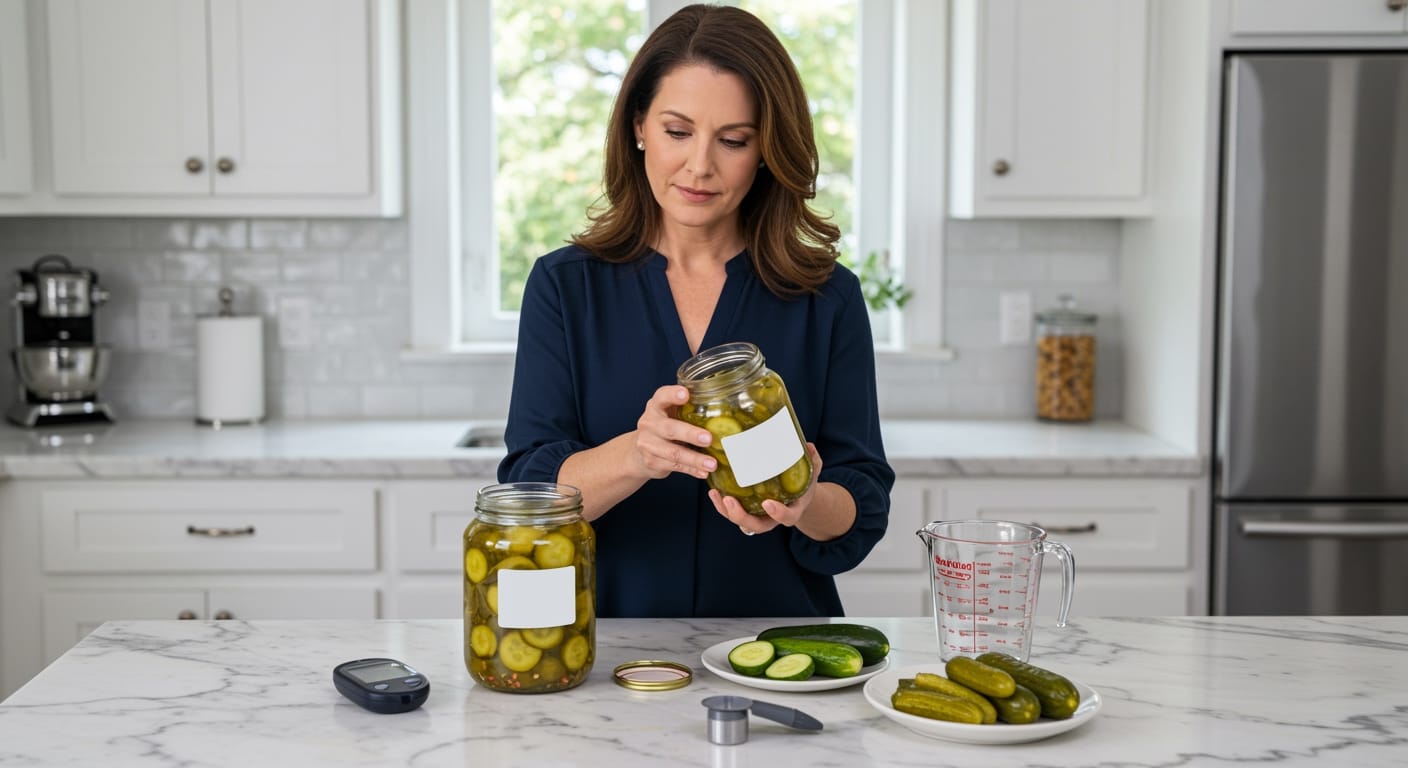✪ Key Takeaway: Pickles can be safe for diabetes when you choose low-sodium, sugar-free varieties and eat them in moderation.
Introduction
You reach for that crunchy pickle spear and suddenly wonder if you are making a mistake with your blood sugar.
Many people with diabetes feel confused about pickles because they taste tangy and seem healthy, but they worry about hidden sugars and sodium content.
Hi, I am Abdur, your nutrition coach and today I am going to explain exactly how pickles affect your blood sugar and which types you can safely enjoy.
Do Pickles Raise Blood Sugar Levels?
Most traditional pickles have minimal impact on blood glucose because they contain very few carbohydrates.
A typical dill pickle spear contains only 1-2 grams of carbohydrates, which translates to less than 5 calories total.
Your body processes these small amounts of carbs without causing significant blood sugar spikes in most people.
The fermentation process actually breaks down some of the natural sugars in cucumbers, making pickles even lower in available carbohydrates than fresh cucumbers.
However, some commercial pickle brands add sugar or corn syrup to their brine, which can increase the carbohydrate content significantly.
Sweet pickles and bread-and-butter pickles often contain 4-6 grams of added sugars per serving, which can affect your glucose levels more noticeably.
✪ Pro Tip: Always check the ingredient list for added sugars like high fructose corn syrup or dextrose.
What About the Sodium Content in Pickles?
The biggest concern with pickles for people with diabetes is not blood sugar but sodium content.
A single large dill pickle can contain 800-1200 milligrams of sodium, which is nearly half your daily recommended intake.
High sodium intake increases your risk of high blood pressure, which often occurs alongside diabetes and creates additional cardiovascular complications.
When you consume excess sodium, your kidneys retain more water to dilute the salt concentration in your bloodstream.
This extra fluid increases blood volume and forces your heart to work harder, raising your blood pressure over time.
People with diabetes already face higher risks of kidney disease, so managing sodium intake becomes even more critical for long-term health outcomes.
✪ Fact: Reducing sodium intake by just 1000mg daily can lower systolic blood pressure by 2-8 mmHg.
Can Fermented Pickles Benefit Diabetes Management?
Naturally fermented pickles contain beneficial probiotics that may help improve glucose metabolism and insulin sensitivity.
These live bacteria cultures support your gut microbiome, which plays a crucial role in regulating blood sugar levels through various mechanisms.
Research shows that certain probiotic strains can enhance the production of short-chain fatty acids in your intestines.
These fatty acids help improve insulin sensitivity by activating specific receptors that regulate glucose uptake in your muscle and fat cells.
The fermentation process also creates acetic acid, which can slow gastric emptying and reduce the rate at which carbohydrates enter your bloodstream.
This slower absorption helps prevent rapid spikes in blood glucose after meals, making it easier to maintain stable blood sugar levels throughout the day.
However, you must choose naturally fermented pickles rather than those made with vinegar and preservatives to get these probiotic benefits.
✪ Note: Look for pickles labeled as naturally fermented or containing live cultures for maximum probiotic benefits.
Which Types of Pickles Should You Choose?
The best pickle choices for diabetes management are unsweetened dill pickles with no added sugars or artificial sweeteners.
Look for brands that use simple ingredients like cucumbers, water, vinegar, salt, and natural spices without any corn syrup or sugar.
Low-sodium varieties are ideal if you can find them, though they may be harder to locate in regular grocery stores.
Kosher dill pickles often have cleaner ingredient lists compared to regular dill pickles, making them a safer choice for blood sugar management.
Avoid sweet pickles, bread-and-butter pickles, and any varieties labeled as candied or honey-sweetened since these contain significant amounts of added sugars.
Making your own pickles at home gives you complete control over ingredients and allows you to reduce sodium while avoiding unnecessary sugar additions.
✪ Pro Tip: Rinse store-bought pickles under cold water to remove excess sodium from the surface.
How Much Can You Safely Eat?
A reasonable serving size for people with diabetes is one medium pickle or two small pickle spears per day.
This portion provides the tangy flavor you crave while keeping sodium intake within manageable limits for most people.
If you eat pickles regularly, consider them as part of your overall sodium budget and adjust other high-sodium foods accordingly.
People with existing high blood pressure or kidney complications should discuss pickle consumption with their healthcare provider before including them regularly.
The timing of pickle consumption can also matter since the acetic acid may help blunt blood sugar responses when eaten before or with meals.
Some people find that eating a small pickle before dinner helps them feel more satisfied and prevents overeating of higher-carb main dishes.
✪ Fact: The average American consumes 3400mg of sodium daily, far exceeding the recommended 2300mg limit.
The Bottom Line
Pickles can be a safe and enjoyable part of your diabetes management plan when you choose the right types and eat them in moderation.
Smart food choices are not about restriction but about making informed decisions that support your long-term health goals.
I would love to hear about your experiences with pickles and diabetes management, so please share your questions or thoughts in the comments below.
References
At NutritionCrown, we use quality and credible sources to ensure our content is accurate and trustworthy. Below are the sources referenced in creating this article:
- PMC: Fermented Foods and Diabetes
- January AI: Pickles Glycemic Index
- Klinio: Dill Pickles and Diabetes
- Diabetes Telecare: Are Pickles Healthy for Diabetics





